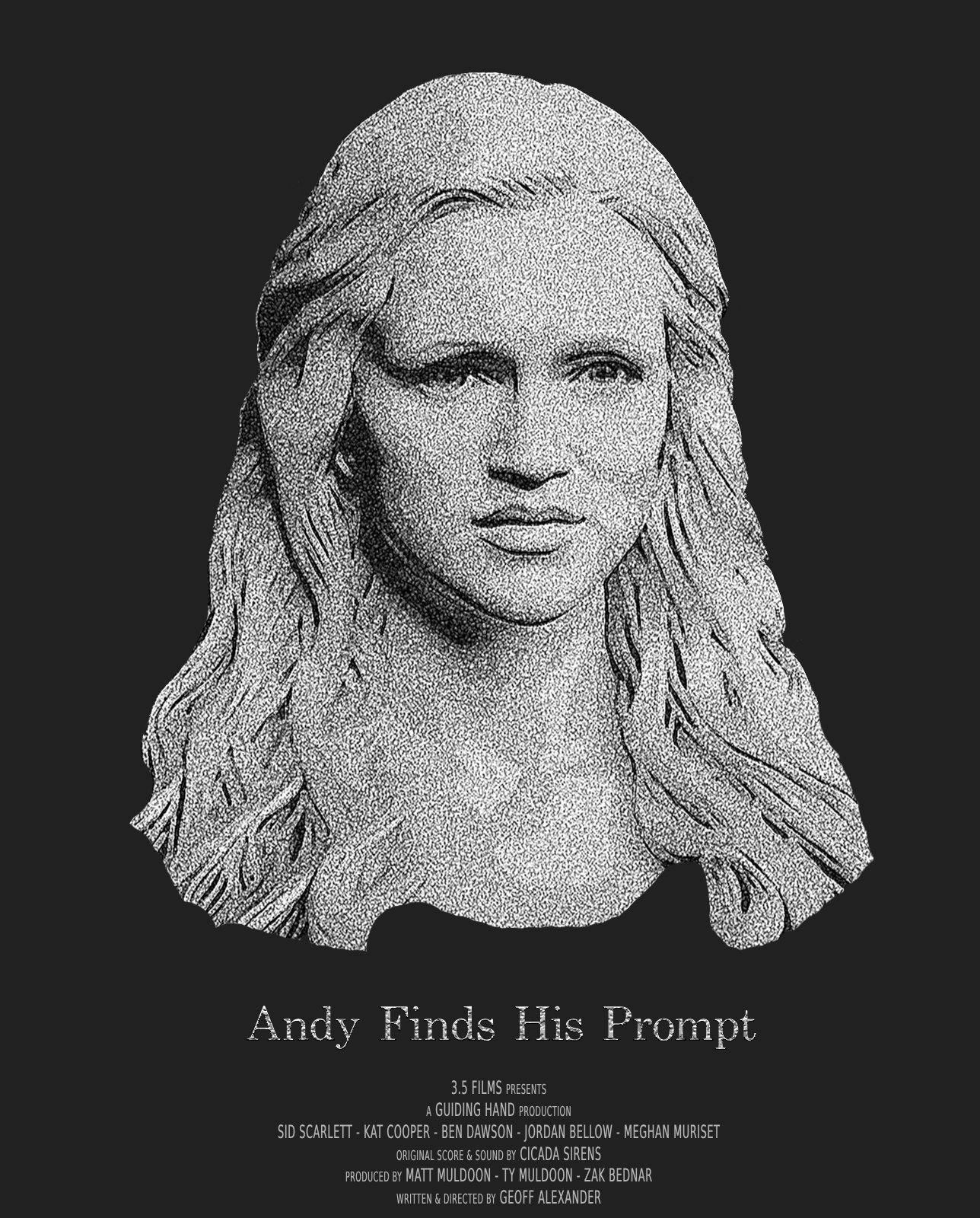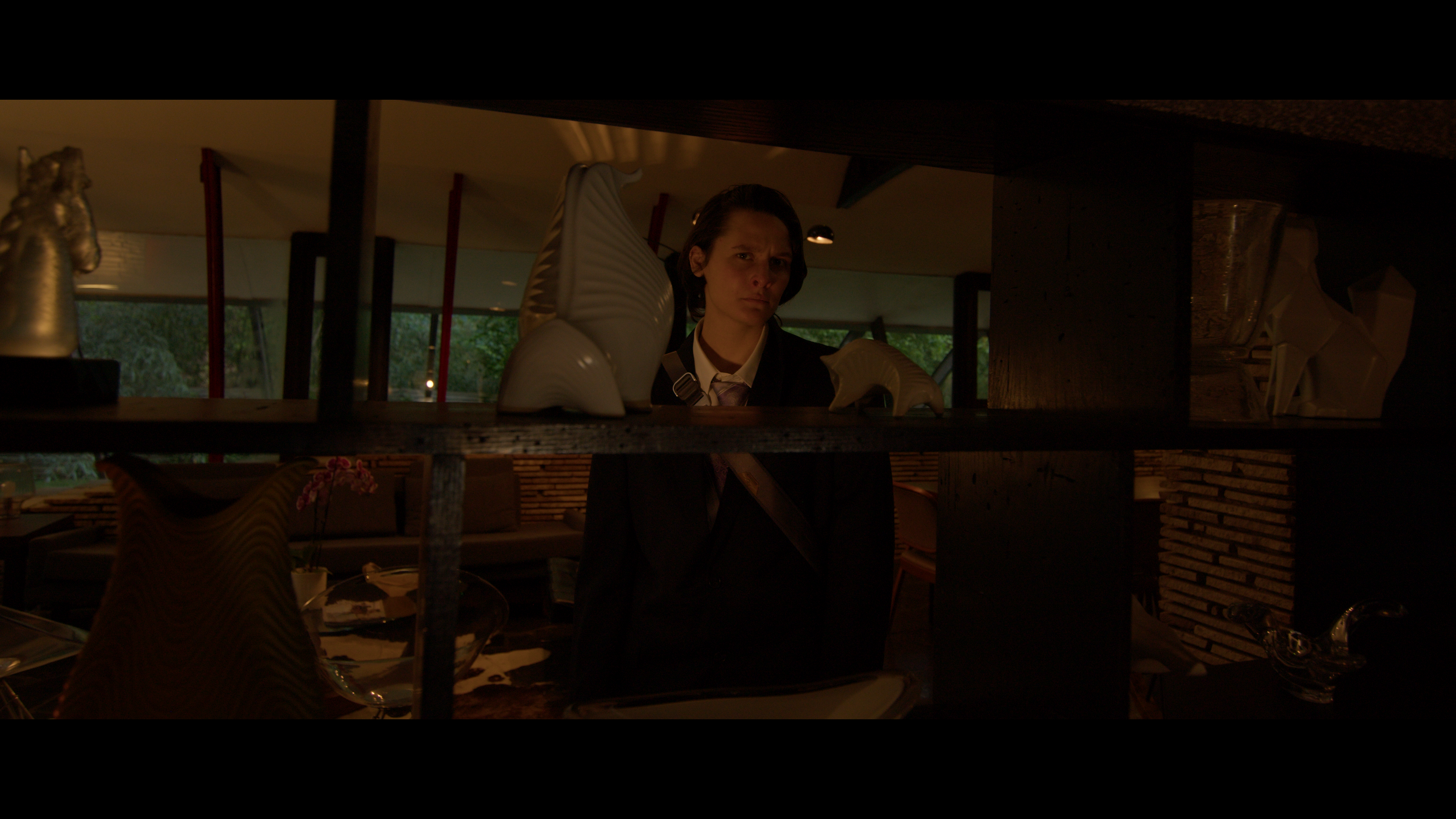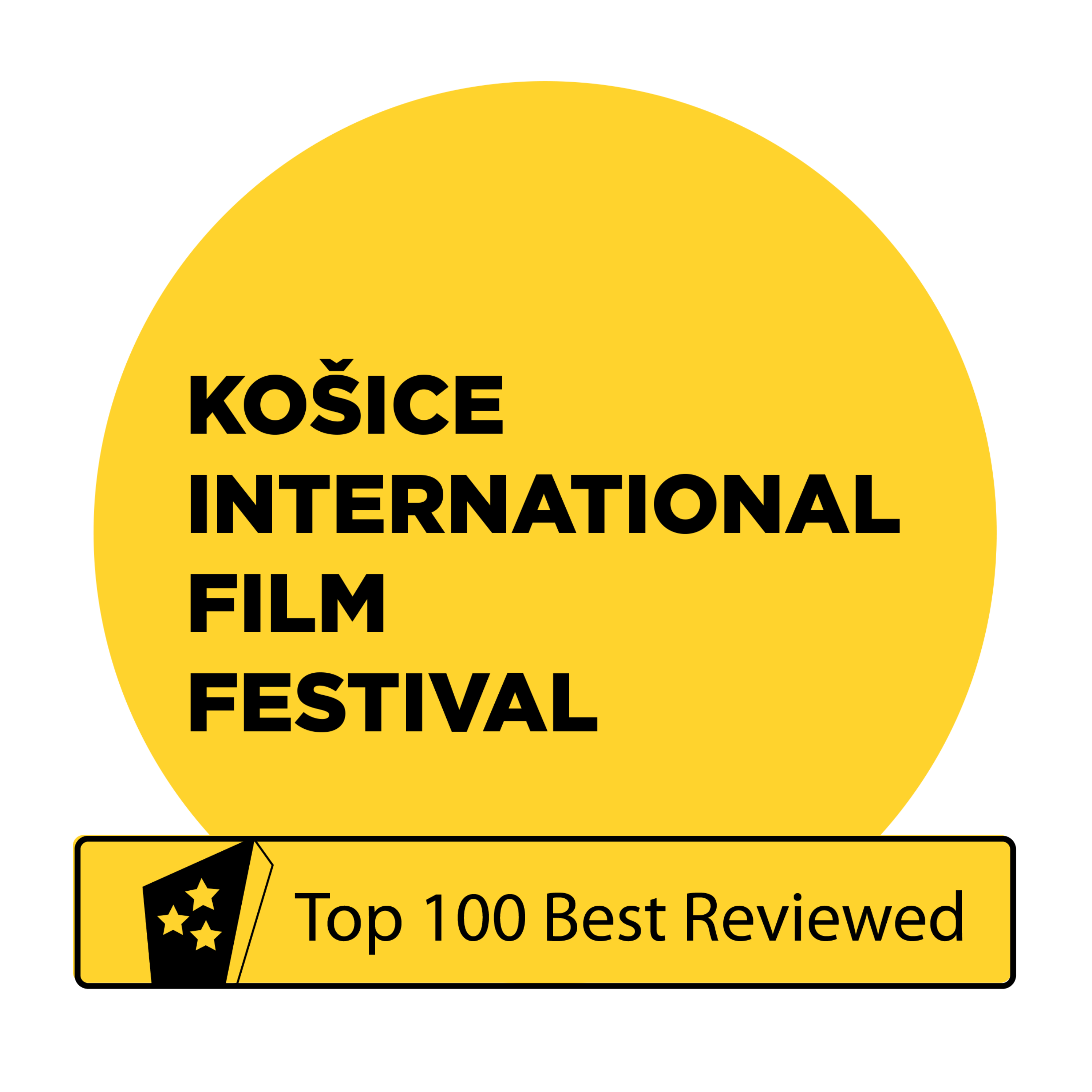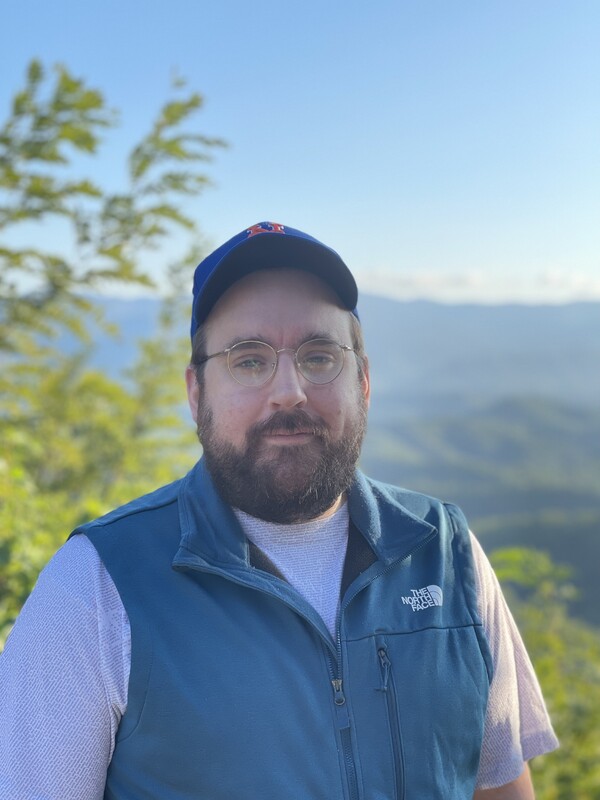Geoff Alexander
Geoff Bokuniewicz is a filmmaker from East Tennessee. His debut short is Andy Finds His Prompt.
What is the story behind your film?
I've always wanted to make movies, but I kinda got away from it for years. The idea of making one seemed impossible, so I never pursued it, and I kind of forced myself not to look too deeply at movies, because it came with an extremely hard-to-describe longing.
About a year ago, I decided to participate in a short film competition for a local film festival. That kickreignited started a dormant love of making movies, so I got some friends together, bought some stuff, and decided to try to make a short.
As for the film itself, it takes place in a near-future where AI has progressed to the point where people can make whole humans for themselves. So now a significant portion of the population is making fake people to date/be romantic with, and this story takes place as one guy tries to find the perfect prompt for his AI girlfriend. I was reading a lot of stuff about people being very sad about their AI chatbot girlfriends being updated and having features and stuff taken away from them, so I was fascinated by that.

What should people take away, gain, realize after watching your film?
I honestly have no idea. Whatever people take away from anything I've ever done artistically is all up to the viewer/audience. Every interpretation is personal and legitimate.
For me, I think that a lot of the internet and changing labor conditions has created a society where a lot fewer people are dating, in relationships, or even looking for that. And there's a general rule of thumb in a lot of stuff that "good enough and cheaper beats better". So I wanted to do something about what that type of world might look like. It's hard being in a relationship. And if you can get 80% of what you want from an app in terms of talking or whatever else, there might be even more people deciding that trying for a human isn't really worth it.

Do you think that films can change people for the better or for the worse?
Both! They're incredibly powerful. I strongly believe that a filmmaker's #1 goal ought to be truth, and if you truthfully portray something–like get at the real essence of something–that it will only have a positive outcome for the world.
But if you do it dishonestly, and you're a very good filmmaker, you can absolutely change people for worse. It's a really effective medium. Arguably the most effective because it communicates so much.
What creation style did you use in the production of your project? What cameraman elements did you use?
Everyone involved in the film has other jobs, so we just tried to shoot it as quickly, efficiently, and cost-effectively as possible. I tried to watch some stuff, but I really just tried to go with whatever kept me motivated, interested, and engaged. I like blocking stuff out, planning it, and then executing, so we just tried to be efficient at that.
As far as camera stuff, I used mostly just a tripod with either a 14-24, 25-70, or 70-300 lens. I like zoom lenses a lot. It's easier to zoom and keep a good shooting pace rather than have to really go nuts on camera placement. I also got a gimbal–DJI Ronin–and used that a lot, which was a lot of fun learning how to do.
How did you select the actors for your project?
I contacted the local colleges + universities near me, the local filming and acting Facebook groups, and basically put out casting calls that I did via Google Meet. One of the actresses my brother knew from years ago and we invited her to audition. We auditioned a bunch of people and selected a few that we think would work well together. I think they did an amazing job.
Why do you think your film should appeal to distributors?
I'm not sure! I have no experience with that, but I'll say that AI is a pretty hot topic and I think we did a good job with the story. I think a lot of people would enjoy it. It's a solid PG-13, but it's really mild on content. I tried to emulate classic Hitchcock that way, and he was able to make great thrillers within the Hays Code.
At which festival has your film been screened?
Bratislava International Film Awards
How did your acquaintances react when they first saw the film?
They liked it! We had a small invite only premiere in a local theater for friends and family, and everyone had positive things to say. Which they probably would in any case, but it seemed like most of them genuinely enjoyed it.
If you could change something in your film, what would it be?
I think I could do a better job lighting a couple of the scenes. I was trying to shoot run-and-gun and use a lot of natural light, but I think I could have done better on just a few of them. I should have gone crazier with it. I like a lot of avant-garde lighting that way.
Which movies are your favorites and why?
My top five favorite movies are Heat, Hana-bi, Punch-Drunk Love, 2001: A Space Odyssey, and Time Bandits. Heat, despite being 3 hours long, is just something I could watch 1000 times. I admire movies that can appeal to a mass audience while also having very deep themes. I was almost a Classics major in college, and I took a ton of Classics classes, so I love how much like The Iliad that Heat is. It's playing with themes that are thousands of years old, about the conflict between family life and your purpose...fate and all that stuff.
Hana-bi is the saddest movie I've ever seen, and I increasingly think Takeshi Kitano is probably my favorite director of all time. I absolutely love his style, and it's just a perfect movie. On a scene-to-scene basis, it's amazing, and he just sits with his main character and rests with it. There's no advancement. It's just a lovingly told story of a guy who can't really communicate without violence and small, sweet moments. It's a lot like The Waterboy and Happy Gilmore, which I also love. But like...a much sadder look at that type of guy, which I strongly identify with. Almost Sopranos-esque a bit.
Punch-Drunk Love was one of the first movies I ever loved as like a serious artistic work, and it shares a lot with Hana-bi. It's very much an Adam Sandler movie as well, but it takes a much deeper look at the loneliness and inability to communicate of that character type.
2001: A Space Odyssey might be the most technically impressive movie ever made, especially for 1968–I can't imagine what it was like seeing that for the first time. But it's also just an incredible movie on every level. Kubrick's best, which is saying a lot. I think it commentates on an incredibly deep level on humanity's ability to technologically progress and how that will affect us. I think it's an extremely pessimistic ending, but also optimistic in some way. You always hope for your children to do better than you, and I hope we at least get a nice designed house if we're going to be slowly replaced by our creation.
Lastly, Time Bandits was my favorite movie as a kid, and it holds up. It's whimsical, hilarious, deep on many levels, just a fantastic adventure tale, and also very clearly a deeply personal story by the creator. It's everything a movie should be.
What topics do you like to address in your stories?
Anything, really. I'm hopeful that I get to make a lot of different types of films. But I hope to focus a lot on nontraditional people, losers, people from lower-class backgrounds, shunned people. I think a big tragedy of current filmmaking is that, while there's more stuff than ever, it seems like there's less of an interest in people on the fringes of society. I think some of that is because a lot of the people making movies now come from, like, organized backgrounds. A lot of upper class people from upper class backgrounds who go to college for it and get a career in it and become part of the system doing it.
I also think some of it is because everyone is online and branded and marketed and trying to put out some type of thing. But no one wants to put out "hey, I'm a loser dork". But I am personally a loser dork. The stakes are very high now, too. If you were embarrassed in your hometown like twenty years ago even, you might get branded as "Oatmeal Pete" or something. But now that's a viral video, and everyone sees it, and you're Oatmeal Pete for the rest of your life. That has to have a civilizing and shying effect on people–you're less likely to do some of the stuff that might get you branded like that by everyone.
But I love those people. Some of my favorite movies are about those people. And movies are incredibly powerful at exploring who those people are. People are never just what they purport to be, and movies are an important part of getting past that and getting to the actual truth.
What is your motivation in making films?
Honestly, I just feel a really strong pull to do it. It just feels right. Helping out the losers and freaks of the world besides myself, hopefully I get to do that. But I'm trying to just do stuff that I like and want to do. And hopefully some people out there like it.
Which contemporary filmmakers motivate you the most?
I really quite liked Midsommar and Hereditary, so Ari Aster for sure. Paul Thomas Anderson is still working, so him for sure. Takeshi Kitano has a new movie coming out this year. I hope him and Martin Scorsese live until they're 200. I really really like Kathryn Bigelow. I hope she gets to make many more. And the Safdies for sure. Uncut Gems and Good time are fantastic. Really looking forward to whatever else they do.
What projects do you plan to shoot in the future?
I'm not sure. There's one movie idea I think I'd like to do next that involves a lot of themes from Kathryn Bigelow and Takeshi Kitano's work, so I'm strongly considering that.
What is the story behind your film?
I've always wanted to make movies, but I kinda got away from it for years. The idea of making one seemed impossible, so I never pursued it, and I kind of forced myself not to look too deeply at movies, because it came with an extremely hard-to-describe longing.
About a year ago, I decided to participate in a short film competition for a local film festival. That kickreignited started a dormant love of making movies, so I got some friends together, bought some stuff, and decided to try to make a short.
As for the film itself, it takes place in a near-future where AI has progressed to the point where people can make whole humans for themselves. So now a significant portion of the population is making fake people to date/be romantic with, and this story takes place as one guy tries to find the perfect prompt for his AI girlfriend. I was reading a lot of stuff about people being very sad about their AI chatbot girlfriends being updated and having features and stuff taken away from them, so I was fascinated by that.

What should people take away, gain, realize after watching your film?
I honestly have no idea. Whatever people take away from anything I've ever done artistically is all up to the viewer/audience. Every interpretation is personal and legitimate.
For me, I think that a lot of the internet and changing labor conditions has created a society where a lot fewer people are dating, in relationships, or even looking for that. And there's a general rule of thumb in a lot of stuff that "good enough and cheaper beats better". So I wanted to do something about what that type of world might look like. It's hard being in a relationship. And if you can get 80% of what you want from an app in terms of talking or whatever else, there might be even more people deciding that trying for a human isn't really worth it.

Do you think that films can change people for the better or for the worse?
Both! They're incredibly powerful. I strongly believe that a filmmaker's #1 goal ought to be truth, and if you truthfully portray something–like get at the real essence of something–that it will only have a positive outcome for the world.
But if you do it dishonestly, and you're a very good filmmaker, you can absolutely change people for worse. It's a really effective medium. Arguably the most effective because it communicates so much.
What creation style did you use in the production of your project? What cameraman elements did you use?
Everyone involved in the film has other jobs, so we just tried to shoot it as quickly, efficiently, and cost-effectively as possible. I tried to watch some stuff, but I really just tried to go with whatever kept me motivated, interested, and engaged. I like blocking stuff out, planning it, and then executing, so we just tried to be efficient at that.
As far as camera stuff, I used mostly just a tripod with either a 14-24, 25-70, or 70-300 lens. I like zoom lenses a lot. It's easier to zoom and keep a good shooting pace rather than have to really go nuts on camera placement. I also got a gimbal–DJI Ronin–and used that a lot, which was a lot of fun learning how to do.
How did you select the actors for your project?
I contacted the local colleges + universities near me, the local filming and acting Facebook groups, and basically put out casting calls that I did via Google Meet. One of the actresses my brother knew from years ago and we invited her to audition. We auditioned a bunch of people and selected a few that we think would work well together. I think they did an amazing job.
Why do you think your film should appeal to distributors?
I'm not sure! I have no experience with that, but I'll say that AI is a pretty hot topic and I think we did a good job with the story. I think a lot of people would enjoy it. It's a solid PG-13, but it's really mild on content. I tried to emulate classic Hitchcock that way, and he was able to make great thrillers within the Hays Code.
At which festival has your film been screened?
Bratislava International Film Awards
How did your acquaintances react when they first saw the film?
They liked it! We had a small invite only premiere in a local theater for friends and family, and everyone had positive things to say. Which they probably would in any case, but it seemed like most of them genuinely enjoyed it.
If you could change something in your film, what would it be?
I think I could do a better job lighting a couple of the scenes. I was trying to shoot run-and-gun and use a lot of natural light, but I think I could have done better on just a few of them. I should have gone crazier with it. I like a lot of avant-garde lighting that way.
Which movies are your favorites and why?
My top five favorite movies are Heat, Hana-bi, Punch-Drunk Love, 2001: A Space Odyssey, and Time Bandits. Heat, despite being 3 hours long, is just something I could watch 1000 times. I admire movies that can appeal to a mass audience while also having very deep themes. I was almost a Classics major in college, and I took a ton of Classics classes, so I love how much like The Iliad that Heat is. It's playing with themes that are thousands of years old, about the conflict between family life and your purpose...fate and all that stuff.
Hana-bi is the saddest movie I've ever seen, and I increasingly think Takeshi Kitano is probably my favorite director of all time. I absolutely love his style, and it's just a perfect movie. On a scene-to-scene basis, it's amazing, and he just sits with his main character and rests with it. There's no advancement. It's just a lovingly told story of a guy who can't really communicate without violence and small, sweet moments. It's a lot like The Waterboy and Happy Gilmore, which I also love. But like...a much sadder look at that type of guy, which I strongly identify with. Almost Sopranos-esque a bit.
Punch-Drunk Love was one of the first movies I ever loved as like a serious artistic work, and it shares a lot with Hana-bi. It's very much an Adam Sandler movie as well, but it takes a much deeper look at the loneliness and inability to communicate of that character type.
2001: A Space Odyssey might be the most technically impressive movie ever made, especially for 1968–I can't imagine what it was like seeing that for the first time. But it's also just an incredible movie on every level. Kubrick's best, which is saying a lot. I think it commentates on an incredibly deep level on humanity's ability to technologically progress and how that will affect us. I think it's an extremely pessimistic ending, but also optimistic in some way. You always hope for your children to do better than you, and I hope we at least get a nice designed house if we're going to be slowly replaced by our creation.
Lastly, Time Bandits was my favorite movie as a kid, and it holds up. It's whimsical, hilarious, deep on many levels, just a fantastic adventure tale, and also very clearly a deeply personal story by the creator. It's everything a movie should be.
What topics do you like to address in your stories?
Anything, really. I'm hopeful that I get to make a lot of different types of films. But I hope to focus a lot on nontraditional people, losers, people from lower-class backgrounds, shunned people. I think a big tragedy of current filmmaking is that, while there's more stuff than ever, it seems like there's less of an interest in people on the fringes of society. I think some of that is because a lot of the people making movies now come from, like, organized backgrounds. A lot of upper class people from upper class backgrounds who go to college for it and get a career in it and become part of the system doing it.
I also think some of it is because everyone is online and branded and marketed and trying to put out some type of thing. But no one wants to put out "hey, I'm a loser dork". But I am personally a loser dork. The stakes are very high now, too. If you were embarrassed in your hometown like twenty years ago even, you might get branded as "Oatmeal Pete" or something. But now that's a viral video, and everyone sees it, and you're Oatmeal Pete for the rest of your life. That has to have a civilizing and shying effect on people–you're less likely to do some of the stuff that might get you branded like that by everyone.
But I love those people. Some of my favorite movies are about those people. And movies are incredibly powerful at exploring who those people are. People are never just what they purport to be, and movies are an important part of getting past that and getting to the actual truth.
What is your motivation in making films?
Honestly, I just feel a really strong pull to do it. It just feels right. Helping out the losers and freaks of the world besides myself, hopefully I get to do that. But I'm trying to just do stuff that I like and want to do. And hopefully some people out there like it.
Which contemporary filmmakers motivate you the most?
I really quite liked Midsommar and Hereditary, so Ari Aster for sure. Paul Thomas Anderson is still working, so him for sure. Takeshi Kitano has a new movie coming out this year. I hope him and Martin Scorsese live until they're 200. I really really like Kathryn Bigelow. I hope she gets to make many more. And the Safdies for sure. Uncut Gems and Good time are fantastic. Really looking forward to whatever else they do.
What projects do you plan to shoot in the future?
I'm not sure. There's one movie idea I think I'd like to do next that involves a lot of themes from Kathryn Bigelow and Takeshi Kitano's work, so I'm strongly considering that.

